Ellen and Jim Have a Blog, Too
We are two part-time academics. Ellen teaches in the English department and Jim in the IT program at George Mason University.


_Pallisers 8:16: we go to a lovely park & witness insider politics: tricks and pressure (2) · 13 November 08
Dear Friends,
We’ve had a thematic essay and description of the transitional structure of 8:16, and seen how Bonteen may be said to its star. Then, a summary, commentary on, transcripts & stills of the 1st 3 of its episodes. Today I go on to summarize the last 2.
With the return of Laura (Anna Massey) and emergence of a new couple’s love story (Adelaide and Gerard, played by Jo Kendall and Jeremy Clyde), the tone of 8:16 takes on a somewhat different hue. Episode 38 ends with Chekhovian note; now another alternative note is struck by a series of bucolic landscapes begining with Episode 39:
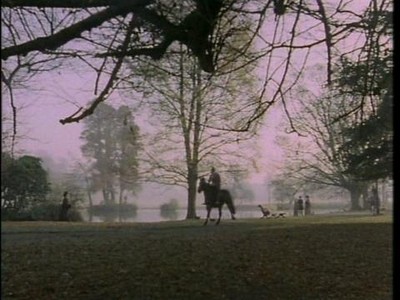
Opening establishment & mastershot
It’s a stylized or set kind of encounter that harks back to 1:1, where we return to the bucolic pink & green motifs of the landscaped park we have not seen since 1:1 when Palliser (Philip Latham) and Griselda, Lady Dumbello (Rachel Herbert) walked together along the shore, and Burgo Fitzgerald (Barry Justice) and Lady Glencora McClusky (Susan Hampshire) kissed among the bushes. The much changed Adelaide-Gerard Maule story returns us to the series’ orginating bucolic note. Fawn (Derek Jacobi) stands in for the Spooner role in Phineas Redux: Derek Jacobi has won me over in his role as Fawn by his injecting genuine dignity and in this episode some sense of uprightness and what’s owed others into his role as opposed to the young Maule who combines characteristics of Trollope’s idle young man with Trollope’s drone of an older Mr Maule.
There are 3 scenes between Adelaide and Gerard in this setting, each one playful, coquettish, rococo if I may use the 18th century expression. It soothes my weary eyes; I prefer landscapes in art to just about anything when they are semi-idyllic, slightly melancholy, twilight coming. This one is early spring and we are told the Pallisers came up to town in early spring. These are wholly invented. The funeral of the Duke in 8:15 was surrounded by early spring like trees and bushes.
We did not return to the idyllic classical garden place at the beginning of these films from Phineas Redux, a motif which was used as a marking place when one novel turned into another in the series for the first three novels: 3:6 when CYFH? turned into Phineas Finn; 5:10 when Phineas Finn turned into Eustace Diamonds. A. O. Cockshut is not the only writer who has written about Phineas Redux as a disillusioned mature pessimistic book. So perhaps it’s not appropriate to return to the Arcadian place for general meeting of all the characters; instead we get this marginalized subdued meeting in the park of two secondary characters. We have only had one hunt in the series thus far (4:8, where Phineas saved Chiltern, a must for a hinge-point in Trollope’s plot-design).
The bucolic park landscape anticipates one of two changes in 8:16 (and 8:15 also): we will go into the park again and there are out-of-doors on location scenes increasingly in these last episodes: as the Duchess and Mrs Finn (Barbara Murray, Madame Max that was) walk in the park together, meet people and when the Duchess and Duke and Mrs Finn go fix up and open Gatherum castle. The second change is the dress of the women has changed: no longer great belles of dresses, but tight bustles and dresses out of Tissot instead of more mid-century painters.
*****************
To continue:
Episode 39: “Laura Returns.” Scene 12) Park, bucolic landscape. Fawn and Adelaide out for a stroll, he invites her to come with him to Westminster Palace, to see art objects; she looks most reluctant, and suddenly emits a “Ah! what a beauty!”
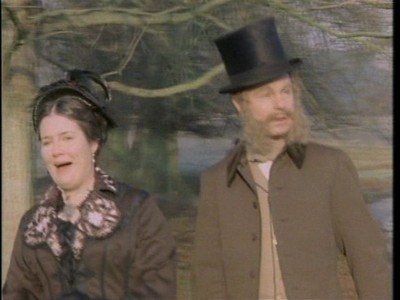
Adelaide (Jo Kendall) and Fawn (Derek Jacobi)
It’s not clear if it’s the horse or Gerard Maule she refers to.
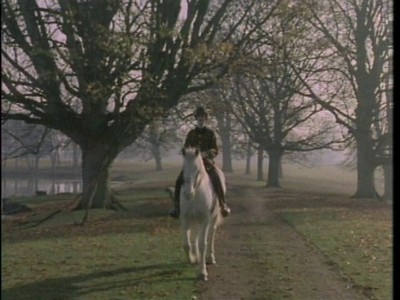
Maule (Jeremy Clyde) riding up on white horse
In the three-way talk Maule and Adelaide spar and tease, flirt, with Fawn’s face registering his sense that this insouciant man is really careless of others (including his horse), selfish, anything but truly amiable. After he rides off, Fawn again asks Adelaide if she’d like to go to Westminster Palace and she replies with the equivalent of I’m washing my hair all week. This off-center ironic kind of meeting has qualities of the young Palliser, Lady Glen, Griselda: Adelaide also dreamy and intense as Lady Glen was in the bethrothal scene. The comparison makes me feel this scene is an indirect juxtapostion to the later scenes of the Pallisers politicking and meant to mark their distance from their first early time together.
Scene 13) The front room of Portman square; still shrouded in sheets, just being re-opened for use. Source is Trollope, Phineas Redux (1983 ed. JCWhale), Ch 38, 340-43. Showing the strength of Trollope’s drama, here Raven is very close, takes over many lines for all three as he has only this tiny scene to make us feel strongly about a large trajectory subplot in Trollope’s book; that of Phineas and Laura’s coping with the consequences of her marriage to Kennedy. In both Lord Brentford sour, a disappointed old man, angry about loss of huge sum; Raven adds funny jokes which as Lord Brentford Lockwood West delivers beautifully:
Finn: “The money was settled I suppose.”
Brentford: “On her children, of course it comes back to her if he dies first, but madmen never do die. They have nothing to trouble them so they live forever.” (In this line Raven remembers the famous scene in Austen’s S&S where Fanny Dashwood says people who get an annuity live forever.)
Phineas (a sombre self-reflexive remark): “I think there is a greal deal troubling Mr Kennedy, Lord Brentford.”
In Trollope’s book Laura is old, sad, in black, and not hopeful; Raven’s heroine (Anna Massey) is ready to begin London politicking life again, even subdued eagerness is here, and the lovely yellow and brown outfit captures this:
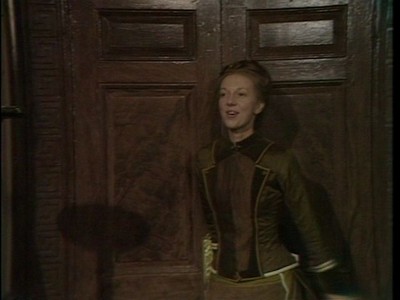
Laura (Anna Massey) vulnerable, open
However, as in Trollope’s book, she is cut off, here cinematographically by Phineas’s worried worn face, where we read his real situation:
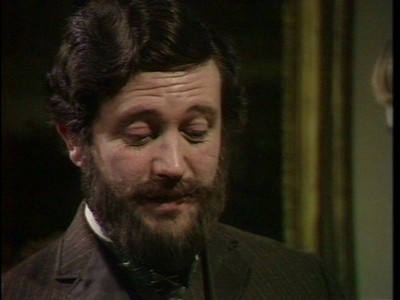
Phineas’s (Donal McCann) truthful rueful face.
And hear his words:
Finn: “To tell the truth at once I know they do not intend to do anything for me.”
Laura: “Who has said so?”
Finn: “Nobody ever says things of that kind. One knows.”
She is deflated, walks off to pour drinks and begins a quiet litany more like her father’s about their “deary lives” with lawyers, but ends again on hopeful note about Phineas coming to visit them “daily” to tell them (her) news, but again Finn counters this: “The way things are with me, Lady Laura, I shall know as much a syou may read in your newspaper.” We know in the film from previous scene (Episode 37, Scene 5) at club with Dolly and newspaper, he was not eager to see Laura in London nor visit her, but is doing it out of a sense of honor, loyalty, and friendship. It is Phineas’s relationship with Lady Laura that is partly causing his outsider status. No one wants to go near him as this public scandal flamed up by Slide continues.
She is so anxious for a friend, but again coming to England what does she want but vicariously to get thrills from listening to politics at second hand. This was her downfall originally, and as in Trollope’s PR where she urges Phineas to marry without love, she does not seem to learn from experience. Her father is an embittered cranky old man very angry that Kennedy (Derek Godfrey) has her dowry. We don’t see Kennedy any more; Phineas’s very presence does stand up for Laura against her father, why she wants and needs him so.
Scene 14) The Club. Short (invented) scene of Dolly (Donald Pickering) and Maule where Dolly informs Maule who Adelaide is & her lack of money; purpose is tone of dialogue which reinforce Maule as a selfish idle man about town and so forms a juxtapostion to Scene 15) Again, lovely bucolic scene in London park between Adelaide and Gerard on horses. Shot of man riding up—from medium to far, long shot; then tree close up, then horse which is then seen to have woman, and she rides up to him. Flirting teasing dialogue which is light and sparring: she has gone riding in the afternoon to find him but he now suggests he will go riding in the morning (though in a steely voice). It’s in the stills (movies communicate through pictures) that the story of their intense sexual attraction is told:
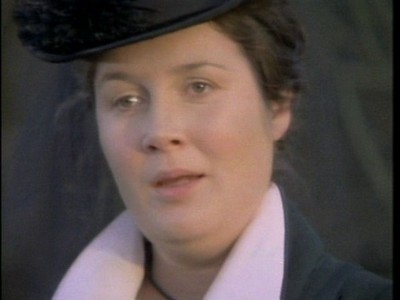
Adelaide dreamy
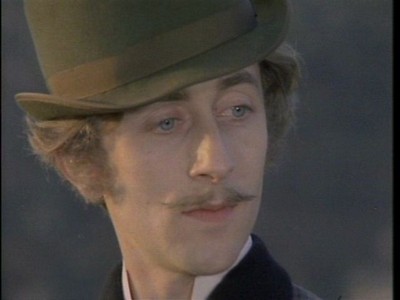
Maule, arch, alert
Scene 16) Palliser’s sitting room, London. PR, Vol 1, Ch 37, pp. 336-38. Numbers of lines taken over; as in Trollope the Duke appears to be invulnerable and not listening to wife, but soon we see she has influenced him. Opens with nice touch of man seeing wife pouring over newspapers and expressing his fondness for her by light touches or a near kiss, and her sensing his presence.
The establishment & mastershot: Duke walking in and we see an intimate room, dressing room probably (next to bedroom). He is looking at Duchess at her desk, with her glasse son, and he smiles fondly to see her in glasses, pouring over newspapers. She is looking at who got what office.
He expresses intimacy and affectionate tender feeling by light touches and near kiss on head, she by sensing his presence and turning to smile:
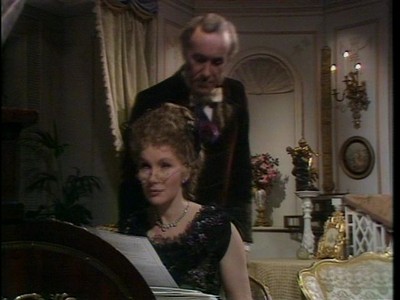
His (Philip Latham’s) fondness & her (Susan Hampshire’s) awareness of his presence
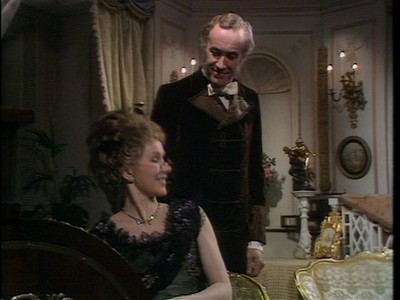
Comfortable reciprocation
The centrality of this scene to the themes of Trollope’s PR and Prime Minister and Raven’s use of Trollope’s resonant (familiar) words makes it imperative to transcribe the scene
2. Dialogue.
Duchess: “There is a right old game of musical chairs there going on in Whitehall at the moment.”
Duke: “Oh a right old game” (He sits, opens up his book to read.)
Duchess looks at him and then starts: “Planty?”
Duke: “Hmmmn?”
Duchess: “Could you oblige me by asking the Prime Minister if he could find a post for Mr Finn?”
Duke (explosive sound slightly muffled coming from him): “Why, my dear, I never interfere”
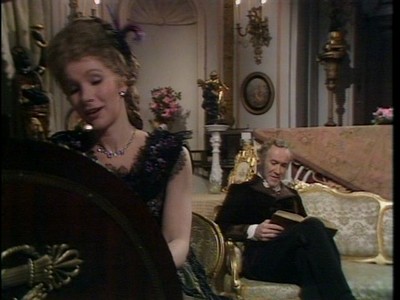
Duke (Philip Latham) says he never interferes
Duchess: (sighs) “That is what everyone says and everyone interferes, otherwise nothing would ever be settled.
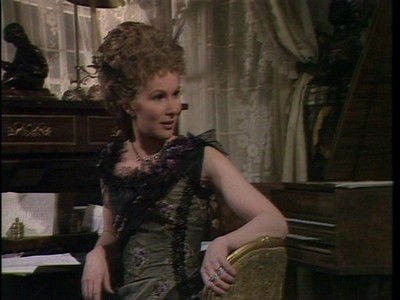
Duchess’s frank disbelief
Well, I am not asking of anything spectacular. Just a junior office. I know there are plenty vacant.”
Duke: (closes book and makes another sound): “Mmmmn. Well, I do not think that Mr Gresham altogether trusts Mr Finn at the moment.”
Duchess: “But you trust him, Plantagenet.”
Duke: “Well, yes, yes, I’d like to do something for him. I shall certainly say as much to Mr Gresham.”
Duchess: “Good!” (turns as if satisfied).
Duke: “Uh Uh. Let me tell you how it is.
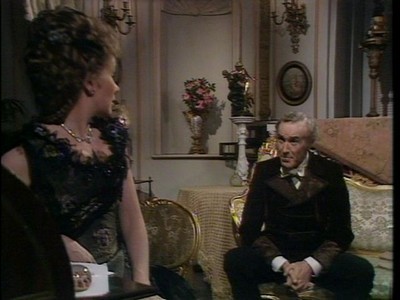
I know very well what will happen then. Mr Gresham will almost certainly consult Mr Bonteen.”
Duchess: “Then he’ll consult a very disagreeable man.”
Duke: “He has been a great help to me over decimal coinage. We may very well need him to go to the Exchequer so his wishes must be considered.”
Duchess: “If Mr Bonteen is to be Chancellor of the Exechequer, I do not see why he should begrudge a minor post to Mr Finn.”
Duke: “Well, Cora, I can promise ya nothing. Now no doubt one day Mr Finn will come into his own .. He must be patient and bide his time.
Duchess: “He is poor and time is not on his side.”
Duke: “I do not interfere.”
Duchess sighs. Last medium close-up on her.
Episode 40: “Position Denied.” Scene 17) Bonteen’s front room. Once again Mr and Mrs Bonteen and Lizzie Eustace, and once again Phineas Redux, Vol II, Ch 45, “Some passages in the life of Mr Emilius”, this time p. 44-45 is milked. Mr Bonteen explains Lizzie can pay Emilius one-half her income or they can try to prove he has another wife in Prague; Mrs Bonteen would prefer her to pay half (to get rid of her) but overruled and her husband insists the only place of “safety” for Lizzie is with him; he evinces pride here. We see him barely able to stop himself from touching her again:
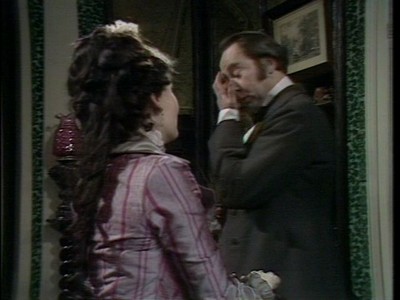
Bonteen (Peter Sallis) finding Lizzie (Sarah Badel) physically irresistible
Lizzie: “But you will protect me, Mr Bonteen.” Camera shows her hand in his and moves over to Mrs Bonteen’s face. He says he will not be able to go himself just now (but “it must be done soon”) since he has a dinner at the Duchess’s. Mr Bonteen deflects Mrs Bonteen’s disappointment at not going by saying this is the sort of thing the real elite do. When he is called to the Exechequer (which he expects to happen momentarily), “Oh then I shall have graver affairs to attend to. well; other grave affairs to attend to.” For a second time Bonteen evinces awareness of a threat from Mr Emilius if they “succeed … when Mr Emilius finds out what we are doing it will put in in a very dangerous mood.” Again, Lizzie’s egregious flattery.
Raven has emphasized how much Bonteen’s attraction to Lizzie Eustace sexually has led to him interfering with Emilius’ pursuit of her, all the while he knows and acknowledges (as Trollope’s Mr Bonteen does not in the book) how enraged this will make Emilius and dangerous (he thinks Emilius will only attack Lizzie and preens he can take care of her). Mrs Bonteen must pretend not to see this growing relationship. He then announces he cannot go to Prague immediately as he must go to this dinner by the Duchess. The wife is unhappy she has not been invited, and he pompously tells her among these high types women are often not invited. As she watches him, we feel she has a better grasp on the human elements of what’s happening around him than he does, and there is an implicit irony that had she been with him, the Duchess would not have been able to lead him on. Mrs Bonteen would have urged him to control himself somehow.
The parallel is seen at the table where Madame Max nudges Phineas and for a moment stops him from exposing himself angrily to Bonteen at Bonteen’s insults so that he does not himself irritate the two Dukes.
Scene 18) Pallisers’ dining room. The source for this and the following effective dramatic scene is two paragraph narration PR, Ch 40, pp. 357-58. (see transcript of hardball treachery) In Trollope’s Phineas Redux, he has one paragraph where he tells of how Lady Glen as Duchess led Bonteen on to make an ass of himself at a dinner party; little more is said than he was overt in showing how he would pressure others, overt in boasting of his coming accession to the cabinet, and embarrassed the Duke of St Bungay in particular who for all his supposed egalitarianism and Whiggishness, knows a vulgar upstart and non-gentleman when he’s around one and doesn’t want to be around such people. Bungay’s discomfort is the sort of thing David Cannadine talked about in his book on the aristocracy’s “decline” in politics: the culture of this group was disrupted and made uncomfortable by the entrance of the rich bourgeois in the 19th century and working class leaders in the 20th.
Raven’s scene includes Duchess, Mr Bonteen, Mr Monk (Bryan Pringle), Dolly Longestaff (Donald Pickering), Phineas, Madame Max, the new Duke of Omnium and the Duke of St Bungay. Lady Glen gets her power by irritating her two top males in ways she knows will serve her purpose. Here is the Duchess flattering Bonteen, leading him on, her face flushed with the pleasure of power and a certain cruel enjoyment of his stupidity.
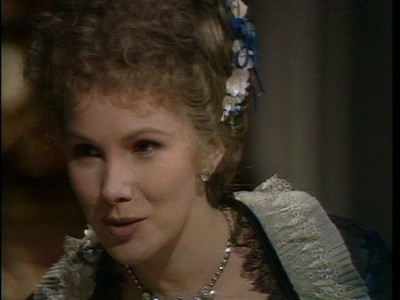
Duchess confidingly leading Bonteen on
The Duchess and Collingwood (her faithful sidekick) get Bonteen drunk. Bonteen is needlessly insulting to Finn—very stupid of him for it’s clear Finn would not be at that table but that he’s liked by these people. Dolly Longstaffe sees what the Duchess is doing and needles her and she needles back. She does not come over as very likeable but certainly as a saloniere-hostess who has power and we are shown how such power is manipulated.
Scene 19) The prime minister’s chamber or meeting room at Parliament. The establishment shot moves to Gresham (Robin Bailey) looking surprized at the the two Dukes, with Barrington Erle (Moray Watson) and further identified male presences (seen from the back). After the dinner where Bonteen ruined himself unknowingly, the two Dukes, Plantagenet and Bungay come to Gresham (the prime minister) to pressure him into not appointing Bonteen. This is after the Duke has refused to interfere on Phineas’s behalf before Lady Glen: so he lied to her so she wouldn’t pressure him and keep himself above her. Yet he does her bidding, probably because Bonteen has misbehaved because Bonteen had not realized the Duke was supporting him partly because he seemed so deferential. The give-and-take, and back-and-forth of manipulation, resentment, theatrics of this scene is superb. Gresham agrees not to appoint Bonteen if they don’t try to find a spot for Phineas partly to save his own face. Raven gives Erle choral interruptions so that while Bungay and Omnium try to give impression they object to something seriously wrong or lack in Bonteen’s character, Erle comments; “You mean Duke that he ain’t bred for it.”
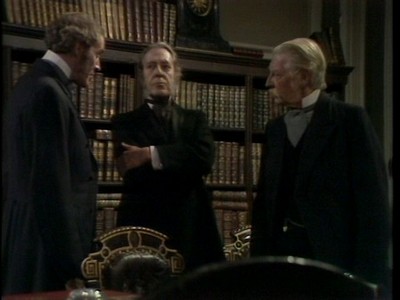
Hardball pressure (Duke, St Bungay [Roger Livesey] & Gresham [Robin Bailey])
The scene closes on Gresham turning back to other business while in the head chair, satisfied at least he did not have to take Finn into his government mainly so he won’t look like he’s giving in that much and “lose face.” Gresham has given in to these two Dukes despite his knowing Bonteen will be very irritated, and will explode once he finds out he won’t be in the cabinet after all. Gresham needs the dukes’s good will more than he needs Bonteen’s.
What a depiction of the way the world works. Raven and David’s commentary adaptation of Phineas Redux is very fine indeed.
Ellen
See various links and a concise summary of 1:1-3:6, 4:7, 4:8, 5:9, 5:10, 6:11, 6:12, 7:13, 7:14, and 8:15, 31-33, 8:15, 34-35
--
Posted by: Ellen
* * *
Comment
- From Nick:
“I turn now to politics … the treatment of politics in the adaptation works, for me, to help to crystallise my general thoughts about Trollope’s ‘political’ writing, and does so in part by what is omitted. As I see (massive generalisation following) we can see and read Trollope as both radical and conservative (using the terms in a general sense).
He is radical because he is cynical about men’s motives, about the struggle for power/status/money, about the way in which both the struggle and the things themselves corrupt. This is translated in the Palliser sequence into a very specific cynicism about the corruption of the House of Commons and Government. Trollope believes in principles (or some principles) and he reserves his fullest venom for those who have no principles – the party hacks, the selfishly ambitious and so on. Trollope is radical because he tears away the cant, and shows that naked greed or powerlust often lies behind the sonorous phrases and procedures.
Trollope is conservative because the principles that he does hold tend to be conservative – anti-Free Trade, anti competitive examination, racist, for the status quo, anti feminist and so on (I am painting with a very broad and possibly unfair brush. These matters become complicated because Free Trade was also the mantra of the industrial capitalists of the day – this does not however make it reactionary. Reading the West Indies and The Spanish Main – or indeed The New Zealander – Trollope’s political conservatism is clear). The one obvious exception to this – in the Palliser books – is his position on certain Irish issues.
(I believe it is this duality which can start to explain why Trollope has two such very distinct sets of supporters/fans/readers – one from the right and one from the left. And of course different aspects dominate different books. It is probably highly salutary for me to continue to battle on with The West Indies in this regard! :)).
Now Raven is generally pretty good with the cynicism. But he undercuts it by tending to write out the principles. If you are just cynical – this is how things are they can be no different – then your cynicism becomes in fact conservative. There is no point in ever doing anything because principles are meaningless. In this sense it does not matter too much what the principles are – I have presented my view above because I am wary of portraying Trollope as more radical than I believe him to be.
But the radicalism is there. In the Palliser books I believe this is shown through such characters as Bunce and Monk, through the genuine dilemmas, very different though they may be,which confront Phineas and Plantagenet, who both certainly possess principles. Trollope’s exact position is ever-shifting, debatable, impossible to finally pin down (that is in part what makes the books so endlessly fascinating). But the tension, the argument, is there.
These issues are very much foregrounded in Episode 16. Mr Bonteen is the epitome of the party hack whom Trollope so despises (‘a hack among the hacks’
is the exact description: PR Chap 32). He would not know a principle if one fell on his head ,and he despises and loathes those who have principles. His sole concern is with party and power. We can see his ilk on television every day of the week.
Now there is something of this in Raven, but it is subsumed by presenting some kind of personal aversion to and animus against Phineas. In turn Glencora is against Bonteen because of his ‘shifty eyes’ (I am not sure if this was the exact phrase but it was something trivial). There is a class element added in as Ellen has noted. Even Monk’s aversion to Bonteen is presented as personal, but since Monk remains a shadowy and secondary figure in Raven (just as Bunce is treated as a comic figure) this seems less important. In any case, to discredit Bonteen Glencora invites him to a select dinner party (with Phineas, Plantagenet, St Bungay, Monk) and gets him drunk thus leading him to talk at length and …and what?
In the adaptation the answer is make a fool of himself. He is exposed as a man who can’t hold his drink, who doesn’t know how to behave. There is something almost cruel about the scene. The next day St Bungay and Plantagenet tell Gresham that if Bonteen is appointed Chancellor they will leave the Government. They advance no particular reasons and Barrington Earle says that the reason is a class one – Bonteen is not one of them/us.”
— Elinor Nov 13, 1:28pm # - P.S. It’s beautiful how slowly everyone is made to age in this series.
E.M.
— Elinor Nov 13, 2:20pm #
commenting closed for this article
